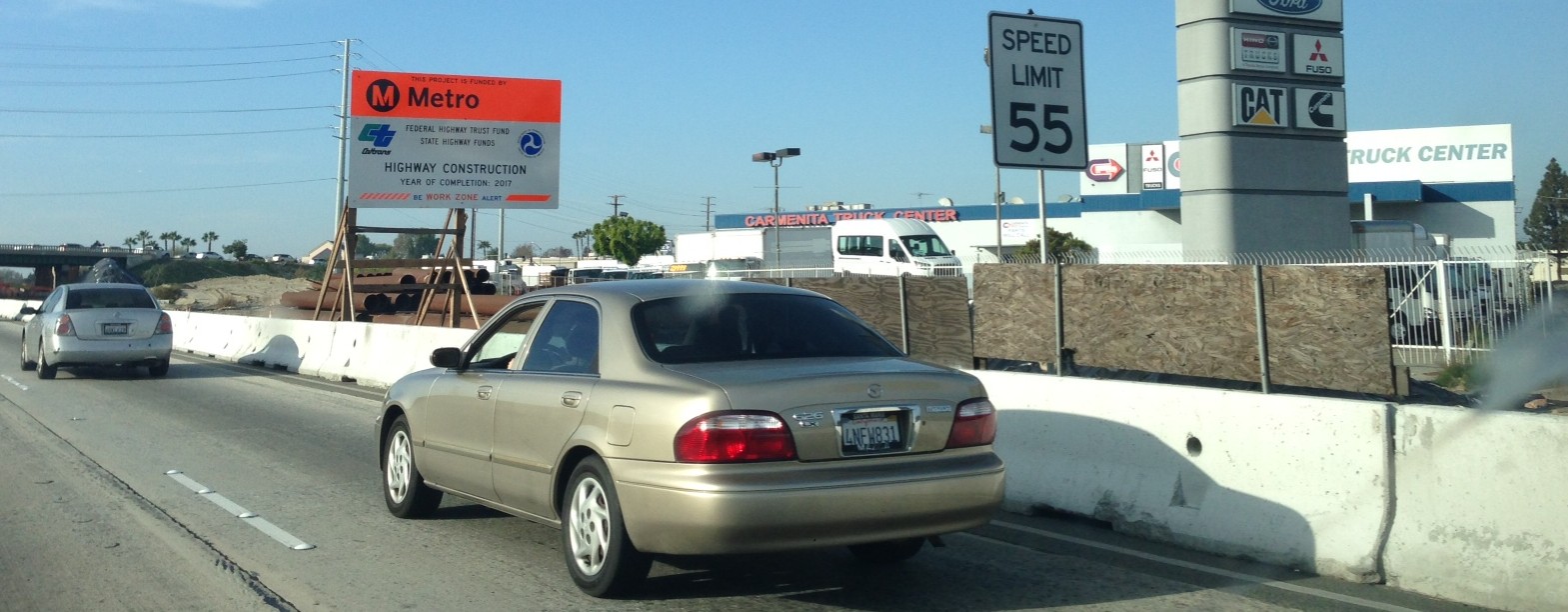In a committee meeting this week, Metro's Chief Program Management Officer Richard Clarke stated that most Metro highway projects "don't affect Vehicle Miles Traveled or greenhouse gas emissions, because they're focused on specific locations where congestion already exists."
Really?
The statement was made at Wednesday's Metro board Planning and Programming Committee. (It begins around minute 1:30 on the meeting video.) Clarke was addressing the committee in response to a board motion directing Metro to assess Governor Gavin Newsom's executive order 19-19 which directs California transportation spending to align with state greenhouse gas emission reduction targets.
Clarke stated that the executive order is "big picture" - generally "applies to state agencies." Clarke notes that California State Transportation Agency (CalSTA) Secretary David Kim has described the executive order as the "beginning of a dialogue statewide." Clarke goes on to say (starting at minute 3:40):
Most of our [Metro's highway program] projects are focused on operational improvements. They're focused at interchanges - interchange to interchange - they're not major lane-widening projects. The expenditure plan doesn't have funding for that and it doesn't describe projects like that either, so most of our projects don't affect vehicle miles traveled or greenhouse gas emissions because they're focused on specific locations where congestion already exists.
Metro CEO Phil Washington brought Clarke from Denver. Clarke has been great heading up Metro's massive construction portfolio. Clarke is very open, straightforward, and frank in discussing Metro's work, and has been helpful in to responding to Streetsblog L.A. questions. Clarke gets things built. He can certainly influence what gets built, but by and large he builds what he is directed to. Freeway and rail mega-projects are all pretty much prescribed by voter-approved expenditure plans in Measures M and R. Any further project prioritization is largely up to the Metro board of directors.
Clarke oversees the highway program, though it is largely in the grip of Senior Executive Officer Abdollah Ansari, who has a reputation for being notoriously pro-car and for expressing hostility to walk, bike, and transit projects - as he nakedly did during the recent debacle which saw multi-modal projects shut out when canceled 710 Freeway funds were redirected.
But is it true that car congestion reduction projects don't affect greenhouse gases? Does Clarke believe this? Does Clarke not understand induced travel? Did Ansari write Clarke's remarks? (They do seemed to be based on the staff report prepared by Ansari.)
The staff report implies that Metro is just neutrally addressing "design deficiencies":
Operational improvement projects are identified based on validation of current deficiencies such as bottlenecks, design deficiencies, accident rates, and other factors resulting in “choke points,” traffic backups and spillovers/diversions to other roadways, compromised roadway safety, loss of lives, and economic losses, with a focus on minimizing the negative impacts of projects.
And that vehicle miles traveled (VMT) is someone else's fault - namely, the people who put the houses too far from the jobs:
VMT is largely escalated due to the longer distances between the origins and destinations of automobile trips. Patterns of residential and commercial development away from the major job/demand centers have been a major factor contributing to increase in VMT.
Are these assertions true? Take a look at two aspects of Clarke's statement:
Most Metro highway projects are "not major lane-widening projects"
The "most" here is deceptive.
Most Metro highway dollars are going to major lane-widening mega-projects, including widenings of the 5 Freeway and the lower 710 Freeway widening. Metro's two 5 Freeway mega-projects are behind schedule and over budget; the current (though expected to grow) costs are $1.3 billion for the north L.A. County 5 and $1.9 billion for the south L.A. County 5. The lower 710 widening is anticipated to cost $6 billion; Metro is currently spending $1.2 billion on early 710 ramp-widening.
The Metro highway program has plenty of smallish interchange and toll lane projects - so, for Metro's highway program, while most projects aren't major widening, most project dollars are going into major widening.
And with north and south 5 Freeway widening projects wrapping up in the next couple years, the newly widened segments become sort of loaded guns spilling congestion into the 5 Freeway in the middle of L.A. County. Caltrans and southeast cities are already looking at extending 5 Freeway widening west of the San Gabriel River. Caltrans has plans to widen the 60 Freeway and others. This infestation of future freeway widenings is unlikely to proceed without Metro funding.
Fixing congested interchanges doesn't "affect vehicle miles traveled or greenhouse gas emissions"
It's 2020... does this really need to be explained again? When agencies like Metro add capacity to reduce congestion (including on those congested interchanges), this induces driving. Of course, more driving means more VMT and more greenhouse gas emissions (not to mention more death, injuries, pollution, and high maintenance costs in the long run).
This has been common knowledge since at least the 1960s, but ignored by highway builders and many elected officials. UCLA professor Michael Manville explains it well in this earlier SBLA post.
There may be reasons to build and widen highways. They are politically popular with drivers. They move goods. Construction creates jobs. Metro needs to make good on voter-approved promises to build highways.
But to say highway projects don't affect VMT and greenhouse gases is a flat-out lie.
The climate crisis is here now. If the current generation is serious about passing a habitable planet on to the next generation, then Metro's highway program will need to make some changes, instead of denying that what they do affects the climate. One early step in this will be to acknowledge these impacts, instead of lying about them.






